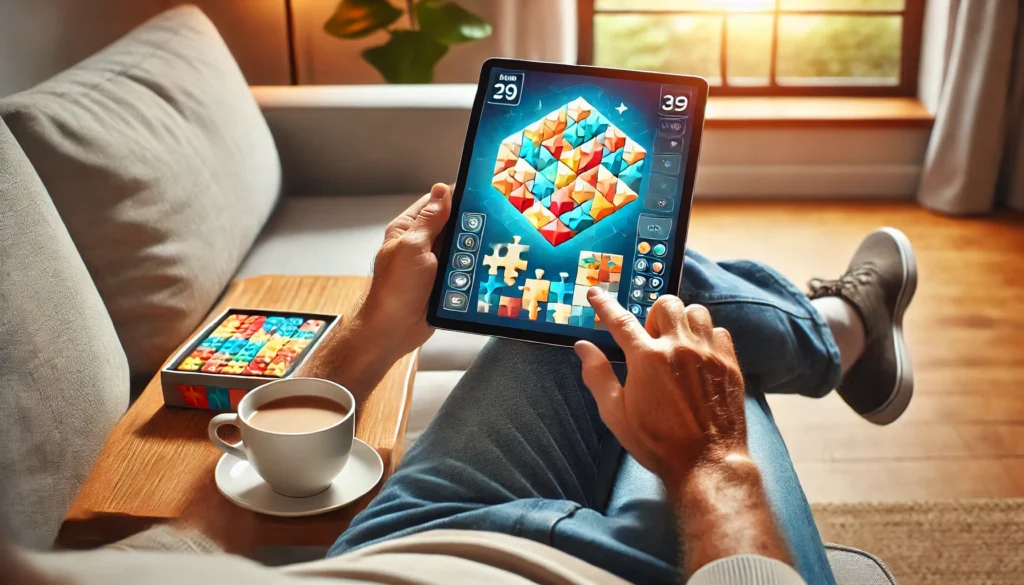In the modern age of distractions, maintaining mental clarity and focus is increasingly challenging for adults. Whether it’s juggling work responsibilities, personal commitments, or the constant barrage of notifications, staying sharp has become a critical skill. But what if improving your concentration could be fun? Enter games to improve concentration for adults—an innovative and enjoyable way to enhance mental performance. From attention games for adults that challenge your memory to strategy-based activities that test your decision-making skills, these tools are scientifically proven to strengthen your focus and overall brain health.
This article explores the most effective games to boost focus and mental clarity, diving into their benefits and the science behind them. By incorporating these activities into your routine, you can enjoy a cognitive workout that’s as entertaining as it is beneficial. Read on to discover how to reclaim your concentration, improve productivity, and unlock your brain’s full potential.
You may also like: How to Improve Working Memory: Top Short-Term Boosters and Practical Tips
Understanding the Importance of Concentration
Concentration is the ability to focus mental effort on a particular task or set of tasks. It’s a cornerstone of productivity and success in both personal and professional life. Research in neuroscience reveals that focus relies on a series of complex interactions between neurotransmitters, neural pathways, and external stimuli. Adults with enhanced concentration tend to be more efficient, creative, and better equipped to solve problems.
However, maintaining focus requires consistent mental training. Cognitive exercises, including games designed specifically to improve attention and focus, can help rewire the brain for sustained concentration. These activities not only target mental sharpness but also improve brain health by promoting neuroplasticity—the brain’s ability to adapt and reorganize itself.
The Science Behind Games That Improve Focus
Games designed to improve concentration are rooted in the concept of neuroplasticity. Cognitive training engages specific brain regions responsible for memory, attention, and executive functions. By challenging the brain, these games encourage the development of new neural connections and the strengthening of existing ones.
Key neurotransmitters involved in focus, such as dopamine and acetylcholine, are also stimulated during these activities. Dopamine enhances motivation and reward-driven behavior, while acetylcholine plays a critical role in learning and memory. Attention games for adults leverage these mechanisms to create a productive and rewarding cognitive workout.
Best Games to Improve Concentration for Adults
Here is an in-depth exploration of games and activities proven to boost focus and mental clarity:
1. Puzzle-Based Games
Examples: Sudoku, Crossword Puzzles, Jigsaw Puzzles
Puzzle games are excellent for engaging multiple cognitive domains simultaneously. Sudoku sharpens logical reasoning and pattern recognition, while crosswords enhance vocabulary and memory. Jigsaw puzzles, on the other hand, require spatial awareness and patience, promoting a state of meditative focus.
Benefits:
- Improves problem-solving skills.
- Enhances working memory and spatial reasoning.
- Reduces stress, allowing for better mental clarity.
2. Memory Training Games
Examples: Lumosity, CogniFit, Simon
Memory games challenge players to recall sequences, patterns, or pieces of information, thereby strengthening short-term memory. Apps like Lumosity and CogniFit offer a range of scientifically designed activities tailored to individual cognitive needs.
Benefits:
- Enhances recall abilities.
- Stimulates neural pathways associated with long-term memory.
- Encourages adaptive thinking in dynamic situations.
3. Attention-Focused Games
Examples: Brain Age, Attention Blink, Focus Pocus
Games explicitly designed to improve attention—such as Brain Age—test the player’s ability to stay focused on rapidly changing information. These games improve sustained and selective attention by filtering out distractions and concentrating on relevant stimuli.
Benefits:
- Boosts sustained focus.
- Reduces susceptibility to distractions.
- Encourages mindfulness during tasks.
4. Strategy Games
Examples: Chess, Go, Risk
Strategy games demand long-term planning, critical thinking, and adaptability. Chess, for instance, exercises both sides of the brain by requiring logical analysis and creative problem-solving.
Benefits:
- Sharpens decision-making skills.
- Enhances strategic thinking and foresight.
- Strengthens mental endurance.
5. Digital Brain Training Apps
Examples: Peak, Elevate, NeuroNation
Brain training apps offer customizable programs targeting specific cognitive functions. They often include games to improve focus, memory, and problem-solving abilities, providing measurable progress over time.
Benefits:
- Tracks cognitive improvements.
- Offers tailored exercises for individual goals.
- Provides flexibility and convenience.
6. Physical Coordination Games

Examples: Dance Dance Revolution, Wii Sports, Table Tennis
Physical activities that require coordination, such as table tennis, are excellent for improving focus. These games challenge both mental and physical faculties, fostering better hand-eye coordination and reflexes.
Benefits:
- Combines physical and cognitive training.
- Enhances reaction time and focus under pressure.
- Promotes overall well-being.
7. Mindfulness and Meditation Apps
Examples: Calm, Headspace, Muse
Mindfulness-based games and activities teach players to focus on their breathing, thoughts, or bodily sensations. These practices train the mind to remain present and reduce the impact of distractions.
Benefits:
- Enhances emotional regulation.
- Improves sustained attention.
- Reduces stress, fostering mental clarity.
How to Integrate These Games Into Daily Life
Integrating these games into your daily routine doesn’t require significant time investment. Start with 10-15 minutes a day and gradually increase as you build the habit. Here are some tips for effective integration:
- Set Specific Goals: Define what you want to achieve—whether it’s better focus at work or improved memory.
- Schedule Regular Sessions: Dedicate consistent times to your cognitive training, such as during lunch breaks or evenings.
- Mix and Match Activities: Rotate between different types of games to challenge various aspects of your cognition.
- Monitor Progress: Use apps or journals to track improvements and adjust strategies accordingly.
- Combine With Lifestyle Changes: Pair cognitive training with physical exercise, a balanced diet, and adequate sleep for maximum benefits.
The Role of Nutrition in Cognitive Enhancement
While games to improve concentration for adults are effective, they work best when paired with proper nutrition. The brain requires specific nutrients to function optimally, including omega-3 fatty acids, antioxidants, and vitamins B6 and B12. A balanced diet rich in fruits, vegetables, lean proteins, and healthy fats can significantly enhance cognitive performance.
Additionally, hydration is vital for maintaining focus. Even mild dehydration can impair cognitive functions such as memory and attention. Ensure you drink adequate water throughout the day to support brain health.
Measuring the Effectiveness of Cognitive Games
The effectiveness of attention games for adults can be measured through:
- Improved Task Performance: Noticing faster completion and better accuracy in daily tasks.
- Enhanced Memory Recall: Remembering names, dates, and details more effortlessly.
- Increased Attention Span: Sustaining focus on demanding tasks for longer periods.
- Feedback From Digital Tools: Many apps provide progress reports that quantify improvements in specific cognitive areas.
The Future of Cognitive Training
As technology advances, the field of cognitive training is becoming increasingly personalized. Future developments may include AI-driven programs that adapt in real-time to individual cognitive needs. Virtual reality (VR) and augmented reality (AR) are also emerging as powerful tools for creating immersive training environments that enhance focus and problem-solving skills.

Achieve Mental Mastery: Your Path to Enhanced Focus
Improving focus and concentration doesn’t have to feel like a chore. By integrating games to improve concentration for adults into your routine, you can turn mental training into an enjoyable and rewarding experience. These games, backed by neuroscience and innovative design, cater to various cognitive needs and offer measurable improvements in focus and mental clarity.
Pairing these activities with a healthy lifestyle—including proper nutrition, regular exercise, and adequate sleep—amplifies their effectiveness. Whether you’re solving puzzles, strategizing in chess, or engaging in digital brain-training exercises, each step brings you closer to unlocking your full cognitive potential.
Embrace the journey toward better focus today and experience the transformative benefits for your productivity, creativity, and overall mental well-being. Start playing, and let the power of focused fun lead you to a sharper mind and a brighter future.
Further Reading
SoM: Boost Your Brain: Working Memory Exercises for Adults
ND: 12 Fun Working Memory Games And Activities For Adults
LH: 25 Memory Exercises That Actually Help You Remember More
MND: 22 brain exercises to improve memory, cognition, and creativity
MMM: How to Improve Working Memory: 8 Exercises That Work
Important Note: The information contained in this article is for general informational purposes only, and should not be construed as health or medical advice, nor is it intended to diagnose, prevent, treat, or cure any disease or health condition. Before embarking on any diet, fitness regimen, or program of nutritional supplementation, it is advisable to consult your healthcare professional in order to determine its safety and probable efficacy in terms of your individual state of health.
Regarding Nutritional Supplements Or Other Non-Prescription Health Products: If any nutritional supplements or other non-prescription health products are mentioned in the foregoing article, any claims or statements made about them have not been evaluated by the U.S. Food and Drug Administration, and such nutritional supplements or other health products are not intended to diagnose, treat, cure, or prevent any disease.


